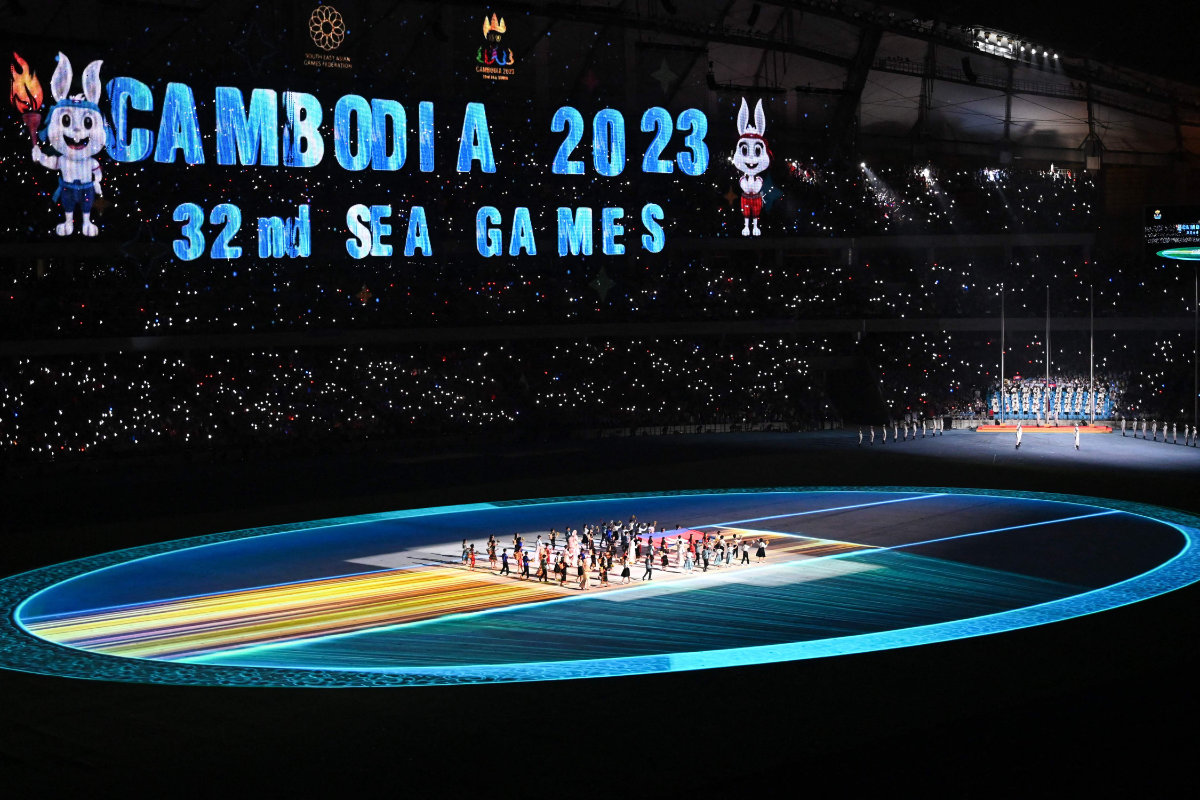Flags and fireworks as Cambodia kicks off SEA Games
PHNOM PENH: Cambodia kicked off its first ever hosting of the Southeast Asian Games on Friday, attended by tens of thousands of spectators, encouraged by free admission and transport.
The evening’s festivities welcomed athletes from across the region to the biennial multi-sport event while trumpeting the country’s rich history and thanking its long-ruling leader for recent modernization.
The event, also known as the 32nd SEA Games, brings together more than 12,000 participants from 11 countries, with athletes competing in more than three dozen sports, including soccer, gymnastics, golf, martial arts, esports, and aquatics. The elaborate opening ceremony included music and dance, with lighting displays extending to the seating area and fireworks.
The countries taking part are Brunei, Indonesia, Laos, Malaysia, Myanmar, the Philippines, Singapore, Thailand, Timor Leste, Vietnam and host Cambodia. All are members of the Association of Southeast Asian Nations except Timor Leste, which attained independence only in 2002 and is in the process of joining the regional grouping.
Prime Minister Hun Sen’s ruling Cambodian People’s Party is keen to build excitement and patriotic fervor around the SEA Games, with a successful event and good medals haul likely to boost national sentiment two months ahead of parliamentary elections which the CPP will almost certainly win.

“For me, this event is very wonderful. We have been waiting for this for 64 years,” said Seng Meng Hong, a 24-year-old attendee.
The SEA Games were first held in Bangkok in 1959.
“I’m so happy that the government could organize such an event so the Cambodian people can come and support the national athletes,” Meng Hong added.
Tickets to the Games have been given away for free and demand has been high.
Prime Minister Hun Sen in late March announced that free tickets would be distributed for all the game’s events, for foreigners as well as Cambodians, and international broadcasters would not be charged for live television coverage rights.
He also said that Cambodia will fully cover food and accommodation expenses for the participating sports delegations, declaring that previous host countries had levied a fee of $50 per person per day for such services.
The games are being held from Friday through May 17 at a newly developed sport complex on the outskirts of the capital, Phnom Penh. Its centerpiece is the Chinese-built Morodok Techo National Stadium, with a capacity of 60,000.
Built and paid for by China, the stadium looms over the open, wooded parts of Phnom Penh’s far outskirts like a crash-landed spaceship.
But its two dramatically cresting pylons also evoke the keel and stern of Chinese trading junks which plied the capital city’s waterways hundreds of years ago.
Almost all in attendance wafted themselves with handheld fans or brandished Cambodian flags — when not participating in an impeccably observed Mexican wave.
All stood for the national anthem when soldiers in ceremonial uniform performed a flag-raising ceremony.
The main production — a riot of golden finery, elegant costumes and spear-toting warriors — told the story of the kingdom, from its founding myths through the Angkor period. Athletes demonstrated Kun Bokator, the national martial art making its debut at this year’s Games.
Skipping ahead to mention a bleaker period, a speaker noted only the end of “the dark era of the genocidal Pol Pot” in 1978 and thanked Cambodian leaders since then for “prosperity and peace.”
The most senior of those leaders were in attendance.
Along with dignitaries including the prime minister of Vietnam and the president of Laos, Hun Sen entered the stadium to great applause.
The prime minister spoke briefly, expressing his gratitude for peace in the country under his leadership and declaring the opening of the Games.
Critics say Hun Sen, one of the world’s longest-ruling leaders, has wound back democratic freedoms in the country as he prepares for the general election in July and has used the courts to stifle opposition.
Several events of the SEA Games have already been played out, and the hosts are top of the medals table for now, with five golds.
Events kick into full gear Saturday, with the Games running to May 17, before the Para Games in early June.
One sport has drawn special attention this year, reflecting deep-seated cultural enmity between Cambodia and its bigger and richer western neighbor, Thailand, whose Thai boxing team is boycotting the games.
The ill feeling between the two countries has its roots from centuries ago, when they were two large and contending empires. In more modern times, the bad feeling has lingered, as Cambodia’s development, hindered by French colonialism and, in the 1970s, the brutal rule of the communist Khmer Rouge, has fallen well behind Thailand’s.
Cambodia on previous occasions had unsuccessfully suggested changing the official name of Thai boxing — a form of kickboxing — from Muay Thai to something with more neutral, less nationalistic connotations. This year, because it is hosting the games, it was able to take more direct action, listing the sport under the name Kun Khmer.
The action outraged Thai kickboxing enthusiasts and raised diplomatic hackles, to the extent that Thailand’s Prime Minister Prayuth Chan-ocha stepped in to call, in vain, for an end to the “pointless” bickering.
Neither country’s sporting council would back down, however, and Thailand decided to keep its kickboxers out of the competition. It said it was justified because the sport is supervised by International Federation of Muaythai Associations, which in turn is recognized by the International Olympic Committee.
Cambodia has treated the event as an opportunity to burnish its regional and international image.
For all the latest Sports News Click Here

